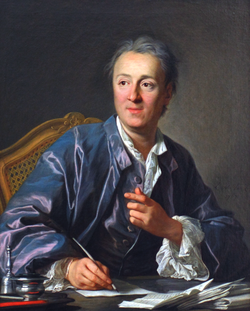Diderot
| Denis Diderot | |
|---|---|

Diderot, by Louis-Michel van Loo, 1767
|
|
| Born |
5 October 1713 Langres, Champagne, France |
| Died | 31 July 1784 (aged 70) Paris, France |
| Alma mater | University of Paris |
| Era | 18th-century philosophy |
| Region | Western philosophy |
| School | Encyclopédistes |
|
Main interests
|
Science, literature, philosophy, art |
| Signature | |
 |
|
Denis Diderot (French: [dəni did(ə)ʁo]; 5 October 1713 – 31 July 1784) was a French philosopher, art critic, and writer. He was a prominent figure during the Enlightenment and is best known for serving as co-founder, chief editor, and contributor to the Encyclopédie along with Jean le Rond d'Alembert.
Diderot's literary reputation during his lifetime rested primarily on his plays and his contributions to the Encyclopédie; many of his most important works, including Jacques the Fatalist, Rameau's Nephew, Paradox of the Actor, and D'Alembert's Dream, were published only after his death.
Denis Diderot was born in Langres, Champagne, and began his formal education at a Jesuit collège in Langres.
His parents were Didier Diderot (1685–1759) a cutler, maître coutelier, and his wife Angélique Vigneron (1677–1748). Three of five siblings survived to adulthood, Denise Diderot (1715–1797) and their youngest brother Pierre-Didier Diderot (1722–1787), and finally their sister Angélique Diderot (1720–1749). According to Arthur McCandless Wilson, Denis Diderot greatly admired his sister Denise, sometimes referring to her as "a female Socrates".
In 1732 Denis Diderot earned the Master of Arts degree in philosophy. Then he entered the Collège d'Harcourt of the University of Paris. He abandoned the idea of entering the clergy and decided instead to study at the Paris Law Faculty. His study of law was short-lived however and in 1734 Diderot decided to become a writer. Because of his refusal to enter one of the learned professions, he was disowned by his father, and for the next ten years he lived a bohemian existence.
...
Wikipedia
